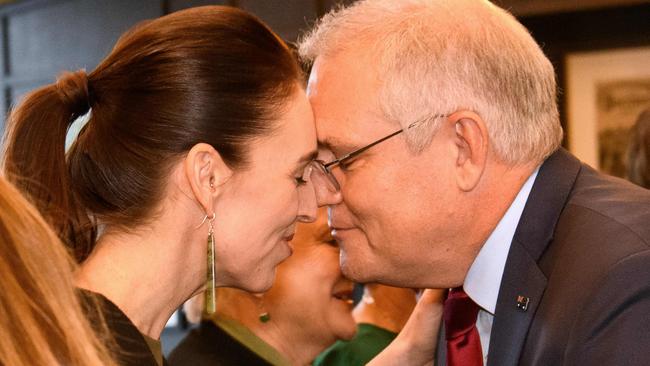Jacinda Ardern, our golden friend in Aotearoa
From her small-town, Mormon family upbringing to her diligence and energy, the story of Jacinda Ardern’s stunning ascent is profoundly democratic.

In November 2019, Stephen Colbert ran a 12-minute segment, “The Newest Zealander”, on The Late Show about visiting Jacinda Ardern in New Zealand and being offered citizenship of Hobbiton. If you haven’t seen it, you should. It’s hilarious. It’s had about 7.5 million views, and 147,000 likes. But then, what’s to dislike? Colbert is at his breeziest, Ardern is simply delightful.
The gentle Maori hongi (nose touching) between Ardern and our own Scott Morrison during his state visit this week, suggests that he, too, feels warmly towards the New Zealand Prime Minister. Certainly, Ardern’s declaration that Australia is “family” will have helped. It was a strategic but also a lovely thing to say. Her capacity for such gestures is characteristic, and has won hearts for her across the globe.
If you pay no more than passing attention to Kiwi politics, you might only vaguely appreciate the nature of Ardern’s achievement and how she won a stunning re-election victory in October 2020. This book, Jacinda Ardern: Leading With Empathy by Supriya Vani and Carl A. Harte provides a fine introduction to all those things.
They contextualise her story well, building it up slowly, without obtrusive political partisanship. Her small-town, Mormon family upbringing, her diligence and energy as a school and university student, her proactive interest in community and idealistic politics are covered in the first part of the book. Her political ascent is covered in the second part. It is a heartening and profoundly democratic story; well worth reading closely.
I was concerned that this book might be a political hagiography – a tediously common phenomenon. Doubtless, hardened souls who dislike Ardern will assert that it is. I don’t think so, having read it closely. But, as something of a China analyst, I turned immediately to the Index to see what entries there might be regarding New Zealand’s relations with the northern behemoth.
The Ardern government has, after all, steered a very different diplomatic course in recent years than has our own. But it is a member of Five Eyes and its outspoken China specialist Anne-Marie Brady has been harassed on Kiwi soil by Chinese agents.

I was disconcerted to find that there was no entry at all under “China” – or “Brady, Anne-Marie”, or “Five Eyes”. The very subjects of foreign relations, strategic security and even economic diplomacy have been omitted from the book. Was that a strategic decision? It seems anomalous in a book published by Hardie Grant, who had the courage, in 2018, to publish Clive Hamilton’s Silent Invasion, when others baulked at doing so for fear of offending official Beijing.
This was a troubling start. But the more of the book I read the more I appreciated the quality of the narrative.
There is a bit of a howler at p.268, at the end of a chapter on the Christchurch massacre (which begins, as it happens, with an account of how Colbert and Ardern became friends and he was offered citizenship of Hobbiton). Here, the authors get their Roman history thoroughly muddled. As a historian, I can’t let this pass.
The chapter is called “Acclaim and the Ides of March” – because the massacre occurred on 15 March 2019. The howler reads as follows: “Was it a coincidence that this day was the Ides of March, an ancient Roman day of religious sacrifice, the ominous day on which Julius Caesar was brutally assassinated in 44BC and which would change the course of ancient history, foreshadowing two centuries of tyranny?”
Was “brutally” intended as a pun on the name of Brutus, the most famous of the assassins? Who has ever been gently assassinated?
Do the authors and their editors realise that Caesar was assassinated by those who wanted to preserve the liberties of the Roman republic against usurpation by a dictator? Do they appreciate that that attempt failed, and that the ensuing tyranny was due to the victory of Caesar’s heirs over his assassins? And “two centuries”? After Caesar, the Empire lasted five centuries, not two.
But I digress. New Zealand’s political system is anything but tyrannous. This book is a rather good introduction to its workings. Three really notable things stand out from it. First, how the young Jacinda Ardern earned her place in that system of government. Second, how she rose to become prime minister, in 2017, on a tide of “Jacindamania”. But the third is the thing that justifies the biography and makes it an inspiring read.

It is how Jacinda Ardern performed superbly as the national leader of a coalition government, through a string of serious crises: the White Island volcanic eruption, catastrophic floods in the South Island, the Christchurch massacre, and then Covid. Such were her qualities of personal leadership in these matters that she won a thumping re-election victory in late 2020, which, on the wings of her leadership and charisma, delivered an outright Labour majority for the first time in decades.
One of the most striking features of the book is its political fair-mindedness, its generosity of spirit. Winston Peters and John Key are treated as honestly and empathetically as are Helen Clark and Norm Kirk. Robert “Piggy” Muldoon not so much, but then, what can one say? Winston Churchill is praised as a great model of leadership, despite his conservatism and nostalgia for empire. In that crucial respect, the authors live up to the theme of their book – that empathy is vital to good leadership and the open society.
This is the core of the narrative: that Jacinda Ardern has led through empathy, breaking the mold of New Zealand political culture and blazing a trail for women in leadership. If for no other reason, this book deserves wide readership. It explores this stirring theme quite superbly. It shows how this young woman, following in the footsteps of Jenny Shipley and Helen Clark, learned the art of politics, then showed how to be a national leader, a world figure and an unassuming human being, all at once.
Paul Monk is a scholar of history and international relations. He is the author of The West in a Nutshell: Foundations, Fragilities, Futures (2009) among other books.
Jacinda Ardern: Leading with Empathy
Hardie Grant
373 pp, $35.00




To join the conversation, please log in. Don't have an account? Register
Join the conversation, you are commenting as Logout